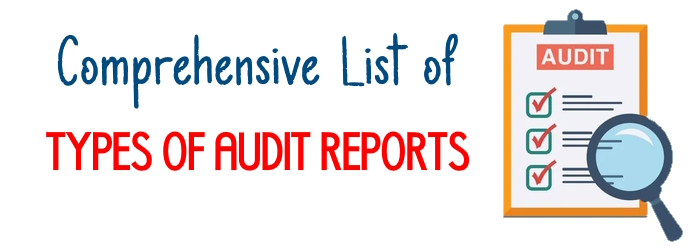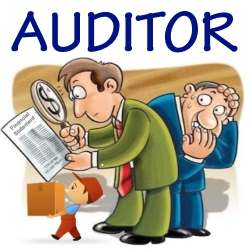Comprehensive List of Types of Audit Reports: Understanding the Different Opinions and Situations
Auditing is a crucial part of financial reporting, providing assurance that financial statements are free from material misstatement. After conducting an audit, an auditor prepares a report that contains their opinion on the financial statements. The type of opinion expressed in the report depends on the findings of the audit and the auditor’s judgment. There are different types of audit reports, each indicating a different level of assurance, ranging from unqualified (clean) opinions to adverse and disclaimer opinions.
In this article, we provide a comprehensive list of types of audit reports, along with explanations of each type and the situations in which they are issued. Understanding these different opinions and situations can help stakeholders interpret audit reports and make informed decisions based on the information presented.

Table of Contents
- 1 Types of Audit Reports
- 1.1 Unqualified Opinion
- 1.2 Qualified Opinion
- 1.3 Disclaimer of Opinion
- 1.4 Adverse Opinion
- 1.5 Disclaimer of Opinion with an Emphasis of Matter
- 1.6 Adverse Opinion with a Qualified Conclusion
- 1.7 Explanatory Paragraph Regarding Going Concern
- 1.8 Disclaimer of Opinion Due to Scope Limitation
- 1.9 Emphasis of Matter Paragraph
- 1.10 Adverse Opinion Due to Scope Limitation
- 1.11 Qualified Opinion Due to Scope Limitation
- 1.12 Adverse Opinion Due to Departure from GAAP
- 1.13 Qualified Opinion Due to Departure from GAAP
- 1.14 Disclaimer of Opinion Due to Departure from GAAS
- 1.15 Qualified Opinion Due to Departure from GAAS
- 1.16 Disclaimer of Opinion Due to Scope Limitation and Departure from GAAS
- 1.17 Qualified Opinion Due to Scope Limitation and Departure from GAAS
- 1.18 Disclaimer of Opinion Due to Independence
- 1.19 Disclaimer of Opinion Due to Significant Uncertainty
- 1.20 Adverse Opinion Due to Significant Uncertainty
- 1.21 Disclaimer of Opinion Due to Inability to Confirm Accounts Receivable
- 1.22 Qualified Opinion Due to Inability to Confirm Accounts Receivable
- 1.23 Adverse Opinion Due to Inability to Confirm Accounts Receivable
- 1.24 Disclaimer of Opinion Due to Management’s Refusal to Allow Audit Procedures
- 1.25 Adverse Opinion Due to Management’s Refusal to Allow Audit Procedures
- 1.26 Disclaimer of Opinion Due to Conflicting Information
- 1.27 Qualified Opinion Due to Change in Accounting Principles
- 1.28 Adverse Opinion Due to Change in Accounting Principles
- 1.29 Disclaimer of Opinion Due to Inadequate Records
- 1.30 Disclaimer of Opinion Due to Scope Limitation and Inadequate Records
Types of Audit Reports
Unqualified Opinion
This is the most common type of audit report and it means that the financial statements are free from material misstatements and are presented fairly in all material respects in accordance with the applicable accounting standards.
Qualified Opinion
This type of report is issued when the auditor has found one or more issues in the financial statements that are significant but not pervasive enough to require a disclaimer of opinion or adverse opinion. The auditor will express an opinion on the financial statements, but will include an explanatory paragraph to highlight the nature and extent of the issues found.
Disclaimer of Opinion
This type of report is issued when the auditor is unable to express an opinion on the financial statements due to a lack of sufficient evidence or limitations on the scope of the audit.
Adverse Opinion
This type of report is issued when the auditor determines that the financial statements are materially misstated, and they are not presented fairly in accordance with the applicable accounting standards.
Disclaimer of Opinion with an Emphasis of Matter
This type of report is issued when the auditor is able to form an opinion on the financial statements, but there is a specific issue that is disclosed in the financial statements that is significant enough to require additional explanation in the auditor’s report.
Adverse Opinion with a Qualified Conclusion
This type of report is issued when the auditor determines that the financial statements are materially misstated, but the misstatements are confined to a specific portion of the financial statements. The auditor will express an adverse opinion on the affected portion and a qualified opinion on the remainder of the financial statements.
Explanatory Paragraph Regarding Going Concern
This type of report is issued when there is substantial doubt about the entity’s ability to continue as a going concern. The auditor will include an explanatory paragraph in the report to highlight the issue.
Disclaimer of Opinion Due to Scope Limitation
This type of report is issued when the auditor is unable to obtain sufficient appropriate evidence due to circumstances beyond their control, such as the unavailability of certain records.
Emphasis of Matter Paragraph
This type of report is issued when the auditor wants to draw attention to a specific matter that is not related to the financial statements, but is relevant to the user’s understanding of the audit report.
Adverse Opinion Due to Scope Limitation
This type of report is issued when the auditor is unable to obtain sufficient appropriate evidence and is therefore unable to express an opinion on the financial statements.
Qualified Opinion Due to Scope Limitation
This type of report is issued when the auditor is unable to obtain sufficient appropriate evidence to support a specific aspect of the financial statements, but the remainder of the financial statements are fairly presented.
Adverse Opinion Due to Departure from GAAP
This type of report is issued when the financial statements are not presented in accordance with Generally Accepted Accounting Principles (GAAP).
Qualified Opinion Due to Departure from GAAP
This type of report is issued when the financial statements contain a departure from GAAP, but the remainder of the financial statements are fairly presented.
Disclaimer of Opinion Due to Departure from GAAS
This type of report is issued when the auditor is unable to obtain sufficient appropriate evidence to support an opinion on the financial statements in accordance with Generally Accepted Auditing Standards (GAAS).
Qualified Opinion Due to Departure from GAAS
This type of report is issued when the auditor identifies a departure from GAAS, but the impact of the departure is not significant enough to warrant an adverse opinion.
Disclaimer of Opinion Due to Scope Limitation and Departure from GAAS
This type of report is issued when the auditor is unable to obtain sufficient appropriate evidence to support an opinion on the financial statements in accordance with GAAS, and there is also a departure from GAAS.
Qualified Opinion Due to Scope Limitation and Departure from GAAS
This type of report is issued when the auditor is unable to obtain sufficient appropriate evidence to support a specific aspect of the financial statements in accordance with GAAS, and there is also a departure from GAAS.
Disclaimer of Opinion Due to Independence
This type of report is issued when the auditor is not independent from the entity being audited.
Disclaimer of Opinion Due to Significant Uncertainty
This type of report is issued when there is significant uncertainty about the entity’s ability to continue as a going concern and the auditor is unable to obtain sufficient appropriate evidence to support an opinion.
Adverse Opinion Due to Significant Uncertainty
This type of report is issued when there is significant uncertainty about the entity’s ability to continue as a going concern and the financial statements are not presented fairly in accordance with GAAP.
Disclaimer of Opinion Due to Inability to Confirm Accounts Receivable
This type of report is issued when the auditor is unable to confirm accounts receivable, and as a result, is unable to form an opinion on the financial statements.
Qualified Opinion Due to Inability to Confirm Accounts Receivable
This type of report is issued when the auditor is unable to confirm accounts receivable, but the remainder of the financial statements are fairly presented.
Adverse Opinion Due to Inability to Confirm Accounts Receivable
This type of report is issued when the auditor is unable to confirm accounts receivable and the financial statements are materially misstated as a result.
Disclaimer of Opinion Due to Management’s Refusal to Allow Audit Procedures
This type of report is issued when management refuses to allow the auditor to perform certain audit procedures, and as a result, the auditor is unable to obtain sufficient appropriate evidence to support an opinion on the financial statements.
Adverse Opinion Due to Management’s Refusal to Allow Audit Procedures
This type of report is issued when management refuses to allow the auditor to perform certain audit procedures, and the auditor determines that the financial statements are materially misstated as a result.
Disclaimer of Opinion Due to Conflicting Information
This type of report is issued when the auditor encounters conflicting information during the audit, and is unable to resolve the conflict through additional procedures.
Qualified Opinion Due to Change in Accounting Principles
This type of report is issued when there has been a change in accounting principles, and the financial statements are fairly presented, but the change in accounting principles has a material effect on the financial statements.
Adverse Opinion Due to Change in Accounting Principles
This type of report is issued when there has been a change in accounting principles, and the financial statements are not fairly presented as a result.
Disclaimer of Opinion Due to Inadequate Records
This type of report is issued when the auditor determines that the entity’s records are inadequate, and as a result, the auditor is unable to form an opinion on the financial statements.
Disclaimer of Opinion Due to Scope Limitation and Inadequate Records
This type of report is issued when the auditor is unable to obtain sufficient appropriate evidence due to a scope limitation and the entity’s records are inadequate.

